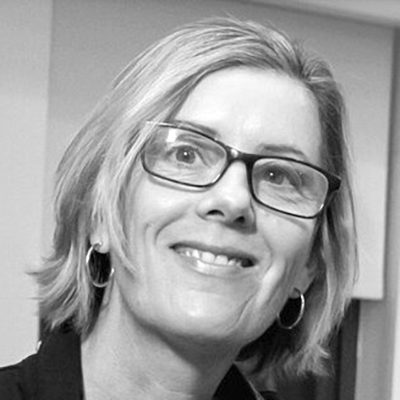About Fran Reilly
Fran Reilly is currently writing her first book on the importance of a free press through a personal and universal story of why we must fight against forces that silence us. She most recently served as Executive Director of News Leaders following an executive search led by Envision Consulting. Before joining News Leaders, Reilly spent many years in the media and start-up space, ranging from top director roles to advising start-ups. She has also served as Executive Director and Publisher of City Limits News, New York City’s oldest nonprofit investigative news agency. Reilly’s career has been marked by identifying opportunities and helping mission-driven organizations find their voice and expand. Reilly was recently featured as a guest on Nonprofit on the Rocks with Envision Consulting’s Matt Kamin.
We asked Fran Reilly what fundraising advice she would give to someone wanting to become the executive director of a nonprofit. Fran talks about how she personally got comfortable with fundraising and shares her observations on how journalists and fundraisers have more in common than we think!
I am definitely someone who has learned that if you don't ask, you don't get, and to be successful in fundraising or in journalism that needs funds, you have to get really comfortable with asking. Like many, I was not wired to ask for money. To go way back, I was 10 years old and almost got kicked out of Girl Scouts because I wouldn't ask my mother for the quarter a week to pay for dues, and so it built up over a really long time. One day the troop leader knocked on my door and was talking to my mother in private. I had owed something like $57.
UNDERSTAND THE DONOR'S PASSIONS AND GOALS
I couldn't ask for money then, but now what I'm able to do is start by trying to understand what the philanthropists’ goals are--because I know that if you don't ask, you don't get. Where are they coming from? What do they want to give to? What do they want to improve and where do they want to have impact? And aligning what our mission is in journalism--or any nonprofit--to what they aspire to have impact on and making those connections. It's making the connection between the person who has the capacity and the organizations that need the funds, and the shared alignment on where they want to have impact in the world.
BUILDING THE NETWORK OF DONORS
And again, if you don't ask, you're not going to get it, so you start with your networks just like everything else. You start with who's close to you, who's interested in this thing that you're interested in and then look at who they know and who that person knows--really starting with those networks and then building out from there.
PEOPLE GIVE TO PEOPLE
I've also found that at the end of the day, people give to people. So even if it's an organization that you're representing, funders are in fact investing in you. Those relationships are really important and sometimes it takes years to build them, and it's worth the time. And so like in any other nonprofit, journalism is the same. There are people out there who believe in First Amendment rights and want journalism to thrive. There are also people who have different issue-related passions, whether it's the environment, social justice, criminal justice, housing, and know that journalism and journalists shed light on the issues, keeping them alive in the public, and understand the importance of keeping that going.
HOW I GOT COMFORTABLE WITH FUNDRAISING
Besides the fact that the business would go out of business unless one did fundraising, for me it's really about finding my comfort level by using a lot of the skills that actually a journalist would have. You have to do research, you have to ask questions and find out what the person on the other side of that philanthropy equation is interested in or is looking for. And then it's creating an authentic story about how their contribution will impact the issue they are interested in, and focused on improving.
BUILD UP THE MUSCLE TO HEAR "NO"--AND BE OKAY WITH IT
Like a lot of other things, you have to build up the muscle to be able to hear “no” and be okay with it. Because now “no” to me is nothing, “no” to me is a total challenge. It’s more like, "Oh, that's so great. I'm going to totally get that. There's no way that a year from now we're not going to be working together." I don't say that out loud, but a “no” is “not now.”
A PRIVILEGED POSITION
A marketer shares the same skills as a fundraiser in terms of putting things out there, seeing what works, what messaging works, what doesn't work, refining and going back out again. But mostly it is about the comfort on the one-to-one level in being able to make the ask. I'm realizing what a privileged position I am in to give money away when I have it: to get money and to put it into a product or program that is helping other people, is a very privileged position to be in. So when I'm making an ask, I'm in that position. I'm not in a position of, "I'm poor, please help me." It's not like that. It's: “We're all in this bigger mission and how can we solve this together?”
________________
Envision Consulting can help with your fundraising strategy and plans! Send us a message so we can help you reach your goals!
Listen to Fran Reilly’s interview on our podcast, Nonprofit on the Rocks with Envision Consulting’s Co-Founder and Managing Partner, Matt Kamin.

